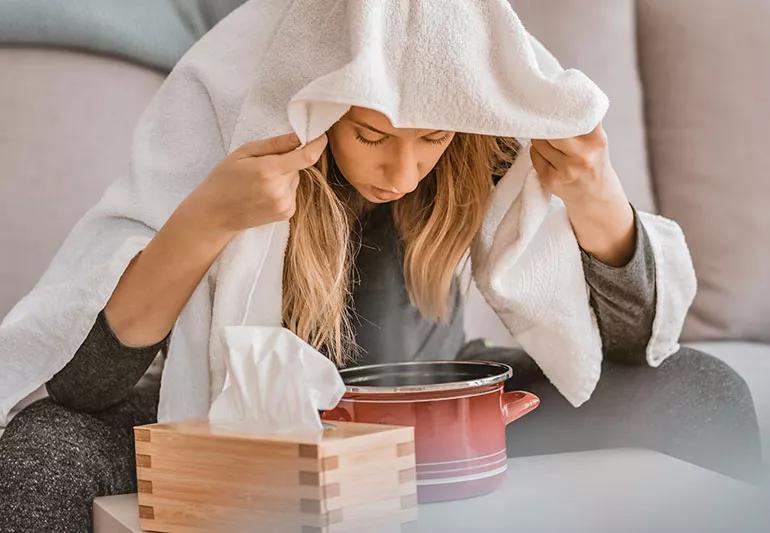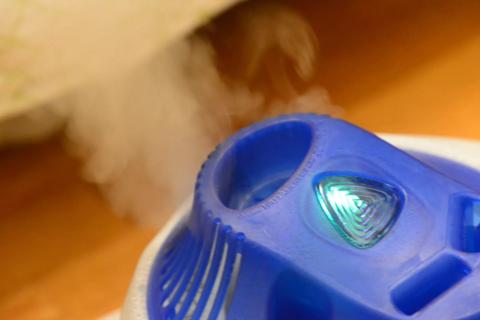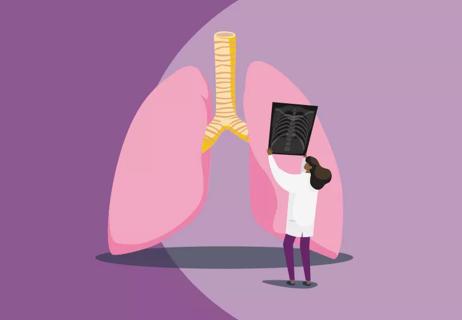7 ways to calm your cough

You have a miserable case of bronchitis, and your cough could wake the dead. Your family members and coworkers are losing patience. Even your pets are getting annoyed by your constant hacking.
Advertisement
Cleveland Clinic is a non-profit academic medical center. Advertising on our site helps support our mission. We do not endorse non-Cleveland Clinic products or services. Policy
Is there anything you can do to calm your agitated airways? Family physician Donald Ford, MD, shares his advice for treating bronchitis at home.
Bronchitis is especially annoying because the cough can last for weeks, even after the infection is gone. So what can you do?
First, make sure you actually have bronchitis. If you’re unsure or you have a high fever, see your doctor to rule out more serious problems like pneumonia, Dr. Ford advises.
If you are battling bronchitis, expect your cough to last several frustrating weeks. Bronchitis is almost always caused by a virus. That means antibiotics won’t help, and there’s not much you can do to speed up the recovery process.
While you’ll have to practice patience as you recover, though, these tricks might help you at least feel a little better while you wait.
While there’s no cure for bronchitis, medicine can help ease symptoms, Dr. Ford says:
Advertisement
Swallow plenty of it to help loosen mucus so that you can cough it up and out (gross, but gratifying). Unfortunately, wine and coffee don’t have the same hydration benefit, so stick to H2O, herbal tea and broths.
When you have a deep cough, it feels like you can’t clear the gunk from your lungs. Steam helps loosen the mucus so you can get rid of it. If you belong to a health club, this is definitely your chance to hit up the sauna. Or just turn on the shower in your own bathroom and let the room get steamy.
You can also fill a pan or pot with boiling water and lean over it to inhale the steam. “But be careful,” Dr. Ford cautions. “Don’t cover your head with a towel to trap the steam, because it can get too hot and burn your airways.”
Use a saline nasal spray or neti pot to flush your sinuses. “Even if symptoms are in the chest, most people have some congestion as well. Nasal saline helps clear out mucus and also hydrates your tissues,” Dr. Ford says. Gargling with salt water can also soothe and hydrate a sore throat.
Tea with honey is an old classic for treating colds. Mother Nature’s favorite sweetener probably won’t do much to clear your cough, Dr. Ford says, but it can soothe the sore throat that often goes along with it.
Despite the name, they don’t do much to clear up mucus. But like honey, they can soothe a raw throat, suppress your cough and help you feel better.
While there’s no evidence that essential oils can help with bronchitis symptoms, some people find breathing steam spiked with menthol oil is especially soothing, Dr. Ford says. “It doesn’t necessarily work better than plain steam, but it can feel good.”
One of the most important things to do when you have bronchitis is to avoid things that will irritate your lungs.
Keep an eye on your local weather, too. Local news and other outlets, like the National Weather Service, will often report your local air quality index, which tracks the level of pollution in the air in your community. The higher the index number, the worse the air quality is, meaning you should stay inside with an air filter on and windows closed.
Advertisement
Because there’s no real cure for bronchitis, the illness can sometimes linger. If it does, look for these signs to know when you should consult your health care provider.
Your doctor can develop a treatment plan that works best for you.
Advertisement
Learn more about our editorial process.
Advertisement

Here's when to see a doctor about that persistent cough

Tips for protecting yourself from common illnesses

Understand the symptoms and causes of these respiratory infections

Dry or wet, acute or chronic — it may point to a cause

Most recommended precautions center around minimizing bruising or swelling

Even one drink can have an impact on your cognitive function leading to slurred speech, blurred vision and impaired memory

Type 2 diabetes isn’t inevitable with these dietary changes

Applying a hot or cold compress can help with pain